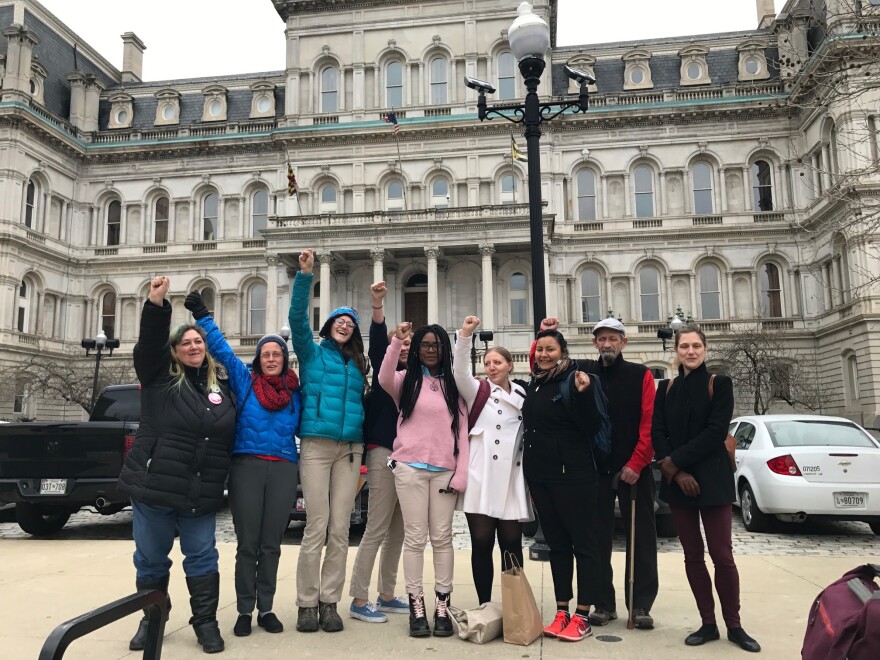The Baltimore City Council on Monday approved two bills that environmental activists in the city had been fighting to advance for years.
The first bans the construction or expansion of any crude oil terminals in the city. The goal of this legislation, which passed by a vote of 14-1 and now must be signed by the mayor, is to reduce the risk that trains carrying volatile crude oil could derail and explode in the city.
The second bill outlaws a petroleum product: Styrofoam cups and fast-food containers, which do not break down in the environment like paper products, and so create a persistent source of litter, and a blight in streams and along roadsides.
Outside city hall, Jennifer Kunze, a program organizer with Clean Water Action, praised the council for the oil terminal bill. She said it was a prudent move for the city, because the rise of hydraulic fracturing as a means of extracting oil about a decade ago fueled a dramatic increase in the number of trains carrying crude oil through populous areas.
“We’ve seen crude oil trains carrying shipments from the Bakken shale region in North Dakota, and the tar sands in Canada, explode really catastrophically when those trains derail or experience an impact,” Kunze said. “And that’s just something we cannot afford to have happen in Baltimore City. It’s just too dangerous, in a city with such old infrastructure and such dense populations.”
The legislation would leave two existing crude oil terminals in the city, on the waterfront in Fairfield and Canton. But it would prohibit more -- as had been proposed for south Baltimore by a Houston-based company called Targa Terminals. Back in 2014, Targa had proposed to open a new terminal to handle almost 400 million gallons per year of crude oil transported through the city and Chesapeake Bay, until it was challenged by the Environmental Integrity Project and finally backed down in 2016.
Jeff Fraley, a board member of a trade organization called Baltimore Industrial Group, testified against the city council bill, arguing that it would make the city less attractive to industry.
“Will this bill ban trains carrying crude oil through the city in the future? The answer is no,” Fraley told the council. “The interstate commerce is protected by the federal government. Will this bill currently make anyone in Baltimore safer today? The answer is no. The trains will continue to run, if they so choose to do so.”
Beyond the safety issue, the push for this legislation was part of a big picture effort by the Chesapeake Climate Action network and allies to discourage new infrastructure for the use of fossil fuels, and instead encourage cleaner wind and solar power.
“This essentially sends a market signal,” said Taylor Smith-Hams of the Chesapeake Climate Action Network. “So we’re not going to be having more crude oil terminals in the city. Which means that we are reducing that market demand for more crude oil to be drilled and extracted and transported here. And in doing so, we are then sending a very clear signal that we want to be getting our energy from cleaner, more sustainable sources.”
The bill passed by the City Council to ban foam cups and containers was the result of a student-led crusade to reduce plastic litter. Claire Wayner and Mercedes Thompson, both seniors at Baltimore Polytechnic Institute worked with a team to rally more than 200 young people in front of City Hall last month with signs and artwork proclaiming “Ban Foam!” and “Baltimore Beyond Plastic.”
“Our group is so elated that the city council has made the right decision to move toward alternatives that are better for our waterways and for people -- and especially that they’ve listened to us,” Wayner said. “Council President Young has consistently brought up the fact that the kids—from our group, Baltimore Beyond Plastic -- were what convinced him to vote in favor of the bill.”
The decision means Baltimore joins the District of Columbia, and Montgomery and Prince George’s counties, in requiring biodegradable and more earth friendly packaging.




